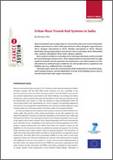|
Many metropolitan cities in India today are concerned by urban mass transit rail systems: Kolkata (operational in 1984), Delhi (operational in 2002), Bangalore (operational in 2011), Gurgaon (operational in 2013), Mumbai (operational in 2014), Chennai, Hyderabad, and a growing number of second-tier cities as well: Jaipur, Kochi, Ahmedabad, Pune, Lucknow, Chandigarh, Patna, Indore, Bhopal, Ludhiana.
Metro projects in India are a booming sector involving tremendous market potential for local and foreign economic actors. Their implementation is associated with very high capital investments and also operation and maintenance costs. Metro projects are also often planned as dedicated spaces within the city with specific land use regulations and building rules (e.g., additional Floor Area Ratio).
This policy paper raises the crucial question of the institutional set up of these large scale transport projects, and the implications in terms of new funding sources such as incentive-based land value capture instruments.
|
Recent Chance2Sustain Publications |
|
|
|
|
|

